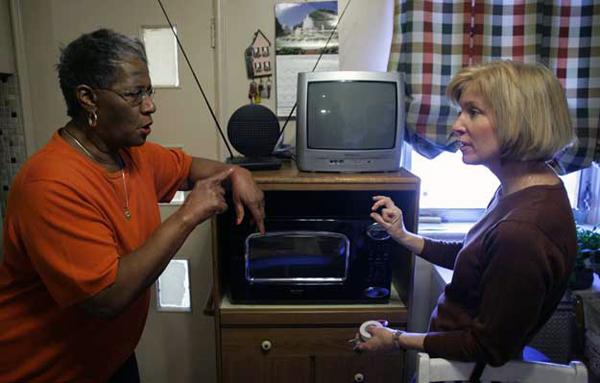(Republished with permission from the St. Louis Post-Dispatch. This article originally ran in the Science & Medicine section on Wednesday, November 26, 2008)

By Blythe Bernhard St. Louis Post-Dispatch
Making sense of all the buttons on microwaves, dishwashers and coffee makers is hard enough when you can see them. For people with impaired vision, the gadgets can become more barrier than convenience.
A program sponsored by Washington University helps people with poor eyesight maintain their independence by modifying their homes to make them more useful and safe.
“Just coming in the house you get a lot of information by seeing the environment,” said occupational therapist Monica Perlmutter.
People with low vision are referred by their doctors to the program, the only one of its kind in St. Louis. The program then assigns a therapist.
On the first visit, the therapist talks to the client about the person’s visual limitation and how it affects his or her life, looking for obvious hazards such as low-lying objects that can be tripped over.
The therapist also checks the intensity and angles of the home’s lighting. A person’s vision can improve by two lines on the eye chart just with adequate lighting, Perlmutter said.
Some clients have trouble cutting food, pouring liquids or matching their clothes, and the therapist will make helpful suggestions.
If the person can’t tell the colors black from navy, for example, the therapist might put safety pins on the tags of all the navy clothes to distinguish them. He or she will also place raised stickers on phones and appliances to allow the client to feel the right buttons.
When drinking, it helps to use white cups for coffee and dark cups for milk, because it’s easier to see liquid levels with the contrast in colors.
Sometimes similar-sized objects can be tricky to tell apart, so therapists put large, reusable “S” and “C” stickers on shampoo and conditioner bottles to avoid confusion.
A problem with cooking is determining when the food is fully cooked. The therapists teach the clients to always cook the same amount, such as a pound of hamburger, for the same length of time.
It takes about five home visits of about an hour each to make the changes and suggestions, Perlmutter said.
The program, which is covered by Medicare and other insurers for people with a doctor’s referral, has served about 200 clients since 2000.
About 3.5 million Americans have low vision, according to the National Federation of the Blind. About a third of that group are legally blind, from conditions including macular degeneration, eye injuries and retinitis pigmentosa. The number of people with low or no vision is expected to increase as the baby boomer generation ages.
At a recent visit to Consuelo Washington’s St. Louis home, Perlmutter came to replace the raised stickers on the “start” buttons of the dishwasher and microwave. The stickers had worn off from use.
Washington, 71, loves to spice up her cooking with oregano, basil and other favorite herbs. But after losing much of the pigment surrounding her retinas years ago, she became unable to read the labels.
So Perlmutter helped her sort the containers alphabetically and place large initials on the lids.
Washington, a retired TWA department manager, said she appreciated not having to ask her husband to read labels, work the microwave or do other daily tasks.
Although the solutions seem simple, every change has helped her manage on her own, Washington said.
“It makes me more independent because those are things I wouldn’t have necessarily thought of.”
bbernhard@post-dispatch.com | 314-340-8129
Copyright 2008 St. Louis Post-Dispatch, Inc.